Don't wanna be here? Send us removal request.
Text
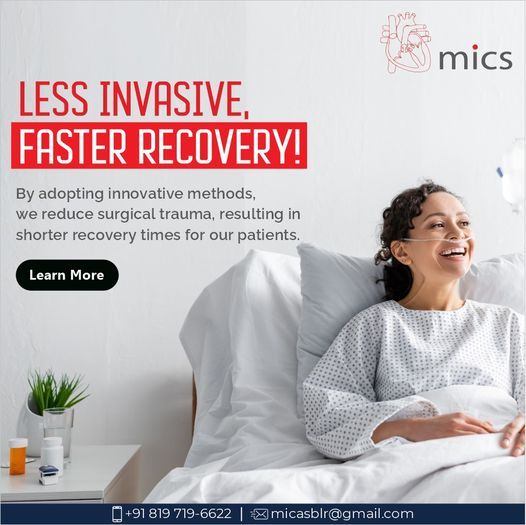
Embracing the advantages of Minimally Invasive Heart Surgery!
At MICSHeart, we believe in providing our patients with the best care possible. Minimally Invasive Cardiac Surgery (MICS) offers a host of benefits, including smaller incisions, reduced pain, faster recovery, and shorter hospital stays. With MICS, we prioritize your comfort and well-being while delivering exceptional outcomes. Experience the future of surgical excellence with us!
Visit Us:- https://www.micsheart.com/article/minimally-invasive-heart-surgery-benefits/
Email ID - [email protected] Mobile No - 081971 96622
The Heart Institute. Apollo Hospital, Bannerghatta Road Bangalore, KA 560 076
#MICSHeart #MinimallyInvasiveSurgery #HealthcareInnovation
0 notes
Text
Key Benefits of Minimally Invasive Heart Surgery

Minimally invasive cardiac surgery duration varies based on the procedure and patient factors. Compared to traditional open-heart surgery, minimally invasive techniques aim to reduce invasiveness and operating times. Minimally invasive coronary artery bypass grafting (CABG) typically takes two to four hours, with small incisions used to access the heart for bypass grafting. For valve repair or replacement surgeries, durations vary: mitral valve procedures range from two to four hours, and aortic valve procedures range from two to five hours. Factors like procedure complexity, patient health, and surgeon expertise influence duration. Surgical teams evaluate each patient's condition and determine the most suitable approach and estimated surgery duration.
Visit Us:- MICS Heart
#micsheart#minimally invasive cabg#robotic heart#minimally invasive cardiac surgery#robotic heart surgery#minimally invasive heart surgery#robotic heart bypass surgery#robotic cabg
0 notes
Text
Minimally Invasive Heart Valve Replacement
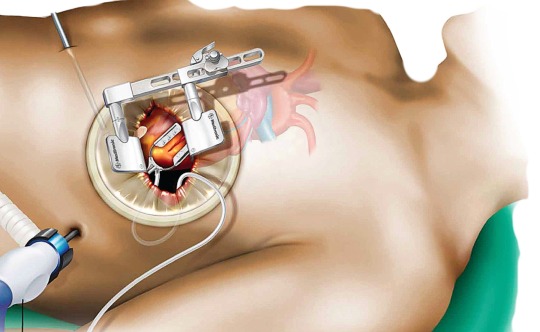
When it comes to treating heart valve disease, minimally invasive heart valve replacement has emerged as a highly effective and innovative procedure. This advanced surgical technique offers numerous benefits over traditional open-heart surgery, allowing patients to experience faster recovery, reduced pain, and improved outcomes. In this article, we will explore the concept of minimally invasive heart valve replacement, its procedure, advantages, and considerations. So, let's dive in and discover the world of minimally invasive heart valve replacement.
What is Minimally Invasive Heart Valve Replacement?
Minimally invasive heart valve replacement is a surgical procedure performed to treat heart valve diseases such as aortic stenosis or mitral regurgitation. It involves replacing a diseased or damaged heart valve with an artificial valve through small incisions, typically between two to four inches long. Unlike traditional open-heart surgery, which requires a large chest incision and dividing the breastbone, minimally invasive heart valve replacement offers a less invasive approach, resulting in reduced trauma to the patient's body.
The Procedure of Minimally Invasive Heart Valve Replacement
The procedure of minimally invasive heart valve replacement varies depending on the specific valve being replaced and the patient's condition. Generally, it involves the following steps:
Anesthesia: The patient is administered general anesthesia to ensure they are unconscious and pain-free during the surgery.
Incisions: Small incisions are made in the chest, typically between the ribs or in the upper chest area.
Insertion of Instruments: Specialized surgical instruments, including a thoracoscope or robotic-assisted tools, are inserted through the incisions.
Valve Replacement: The damaged heart valve is carefully removed, and a prosthetic valve is implanted in its place.
Closing Incisions: After the valve replacement is complete, the incisions are closed using sutures or surgical staples.
Recovery: The patient is monitored closely in the intensive care unit (ICU) for a brief period before being transferred to a regular hospital room. The recovery time is typically shorter compared to open-heart surgery.
Advantages of Minimally Invasive Heart Valve Replacement
Minimally invasive heart valve replacement offers several advantages over traditional open-heart surgery. Let's take a closer look at some of these benefits:
Smaller Incisions: The use of smaller incisions in minimally invasive procedures leads to reduced trauma, less scarring, and a lower risk of infection.
Faster Recovery: Patients who undergo minimally invasive heart valve replacement generally experience a quicker recovery time compared to open-heart surgery. This means less time spent in the hospital and a faster return to daily activities.
Reduced Pain: Smaller incisions and less tissue trauma result in reduced post-operative pain for patients.
Shorter Hospital Stay: Minimally invasive procedures often require a shorter hospital stay, allowing patients to return to the comfort of their homes sooner.
Improved Cosmesis: The smaller incisions used in minimally invasive procedures result in less noticeable scars, contributing to improved cosmetic outcomes.
Considerations for Minimally Invasive Heart Valve Replacement
While minimally invasive heart valve replacement offers numerous benefits, it may not be suitable for everyone. Some factors to consider include:
Valve Suitability: The type and severity of the heart valve disease determine whether a patient is a suitable candidate for minimally invasive heart valve replacement. In some cases, traditional open-heart surgery may be necessary.
Patient's Overall Health: The patient's overall health and any co-existing medical conditions play a role in determining the most appropriate treatment approach.
Surgeon's Experience: Minimally invasive heart valve replacement requires specialized surgical skills and expertise. Choosing an experienced surgeon is crucial for a successful outcome.
Conclusion
Minimally invasive heart valve replacement has revolutionized the treatment of heart valve diseases, offering patients a less invasive option with significant advantages. From smaller incisions and faster recovery to reduced pain and improved cosmetic outcomes, this procedure has transformed the landscape of cardiac surgery. However, it is important to consider individual factors, consult with healthcare professionals, and choose experienced surgeons to ensure the best possible outcomes. If you or a loved one are facing heart valve disease, minimally invasive heart valve replacement may be a viable treatment option worth exploring.
#Minimally invasive heart valve replacement#heartsurgeon#heart sugery#robotic open heart surgery#micsheart#robotic heart surgery
0 notes
Text
What to Expect After Minimally Invasive Heart Surgery

Minimally invasive heart surgery is a surgical approach that aims to treat various heart conditions with less trauma and faster recovery compared to traditional open-heart surgery. If you or a loved one are scheduled for minimally invasive heart surgery, it's important to know what to expect during the post-operative phase. While the specific procedures and individual experiences may vary, here are some general aspects to consider:
Initial Recovery Period: After the surgery, you will be moved to the recovery room, where medical professionals will closely monitor your vital signs, such as heart rate, blood pressure, and oxygen levels. You may have small tubes, called catheters, in place to drain fluids from the surgical site. Expect to spend a few hours in the recovery room before being transferred to a regular hospital room.
Hospital Stay: The length of your hospital stay after minimally invasive heart surgery can vary depending on factors such as the complexity of the surgery and your overall health. In many cases, patients may be discharged within a couple of days, while others may require a slightly longer stay. Your medical team will monitor your progress, manage pain, and ensure that you are ready for discharge.
Pain Management: It's normal to experience some pain and discomfort after surgery. Your healthcare team will provide appropriate pain medications to help manage your discomfort. It's important to communicate any pain levels and concerns with your medical team so they can adjust your medication accordingly. As you recover, the need for pain medication will gradually decrease.
Wound Care: Minimally invasive heart surgery involves small incisions, which typically result in smaller scars compared to traditional surgery. Your incisions will be closed with dissolvable stitches or surgical glue. Your healthcare provider will provide specific instructions on how to care for your wounds, including when and how to change dressings. It's important to keep the incision sites clean and dry to prevent infection. Be sure to follow your healthcare team's guidance regarding wound care.
Physical Activity and Rehabilitation: While rest is crucial during the early stages of recovery, your healthcare team will encourage you to gradually increase your physical activity as you regain strength. Walking is often recommended as a starting point to promote circulation and prevent complications like blood clots. Your medical team may provide guidelines on exercises and activities to aid your recovery. In some cases, you may be referred to a cardiac rehabilitation program to further support your recovery.
Dietary Considerations: A healthy diet plays a vital role in your recovery after minimally invasive heart surgery. Your healthcare team may provide specific dietary guidelines tailored to your needs. These guidelines may include consuming a balanced diet rich in fruits, vegetables, lean proteins, and whole grains. Adequate hydration is also important for a smooth recovery.
Follow-up Care: After being discharged from the hospital, you will likely have scheduled follow-up appointments with your surgeon and cardiologist. These appointments are important for monitoring your progress, evaluating the surgical outcomes, and making any necessary adjustments to your medications or treatment plan. It's essential to attend these follow-up visits and communicate any concerns or symptoms you may have.
Remember, the recovery process after minimally invasive heart surgery can vary from person to person. It's important to follow your healthcare team's guidance and instructions for a successful recovery. By taking proper care of yourself, following the recommended post-operative care plan, and attending follow-up appointments, you can expect to regain your strength and resume your normal activities over time.
#Minimally Invasive Heart Surgery#micsheart#robotic heart surgery#robotic heart#robotic open heart surgery#robotic cabg
0 notes
Text
Benefits of Minimally Invasive Mitral Valve Repair

Minimal incision means you don’t need to undergo complicated and risky open-heart surgeries
Rapid healing means you will heal faster and take less time to recover.
Minimally invasive mitral valve surgery/replacement has a low risk of infection and blood loss during surgery.
You will recover fast, which means short hospital stays, and you will not get burdened with expensive hospital bills.
Minimal incision means reduced scarring due to surgical operation.
Visit Us:- Minimally Invasive Mitral Valve Repair
#Minimally Invasive CABG#Minimally Invasive Aortic Valve Replacement Recovery Time#Minimally Invasive Aortic Valve Replacement#Robotic Heart Surgery#Robotic Bypass Surgery#Robotic Heart Bypass Surgery#Robotic Heart#Robotic Open Heart Surgery#Robotic Cardiac Surgery#Robotic Heart Surgery Cost#Robotic Mitral Valve Repair#Robotic Heart Valve Surgery#Robotic Mitral Valve Replacement#Minimally Invasive Mitral Valve Repair
0 notes
Text
What are the benefits of Minimally Invasive Bypass Surgery?

Less Pain: Minimally Invasive Bypass Surgery reduces post-procedure discomfort compared to traditional open heart surgery.
Less Scarring: Patients experience minimal scarring and improved cosmetic results with Minimally Invasive Bypass Surgery.
Faster Recovery: Patients can resume regular activities and return to work sooner with Minimally Invasive Bypass Surgery.
Shorter Hospital Stay: Minimally Invasive Bypass Surgery allows for a shorter hospital stay, typically 4 days compared to 8-10 days with open heart surgery.
Minimal Complications: The risk of complications, such as infection and bleeding, is lower with Minimally Invasive Bypass Surgery.
Decreased Blood Loss: Minimally Invasive Bypass Surgery results in less blood loss compared to open heart surgery.
Other benefits include better survival rates, lower risk of depression, and fewer kidney or liver complications.
Visit Us:- https://www.micsheart.com/minimally-invasive-bypass-surgery/
#Robotic Heart Surgery#Robotic Bypass Surgery#Robotic Heart Bypass Surgery#Robotic Heart#Robotic Open Heart Surgery#Robotic Cardiac Surgery#Robotic Heart Surgery Cost#Robotic Mitral Valve Repair
0 notes
Text
Robotic Heart Bypass Surgery vs. Traditional Bypass Surgery

Bypass surgery is a common procedure to improve blood flow to the heart. Traditionally, bypass surgery is performed through a large incision in the chest, which allows the surgeon to access the heart and create new pathways for blood to flow around blocked arteries. However, technological advances have made it possible to perform bypass surgery using robotic-assisted techniques. In this article, we’ll explore the differences between robotic heart bypass surgery and traditional heart bypass surgery and help you decide which is best for you.
Approach to the Heart
In traditional bypass surgery, the surgeon typically makes a large incision in the chest to access the heart. This incision can be several inches long and may result in significant scarring. In contrast, robotic heart bypass surgery uses smaller incisions that allow the surgeon to access the heart with greater precision and control. This minimally invasive approach can result in less pain, reduced scarring, and faster recovery times for the patient.
Incision Size
The incisions used in robotic heart bypass surgery or Minimally Invasive Heart Surgery are typically much smaller than those used in traditional bypass surgery. In robotic heart bypass surgery, the surgeon makes several small incisions in the chest, each less than an inch long. These small incisions allow the surgical instruments to be inserted into the chest cavity and access the heart. Smaller incisions can reduce the risk of infection, reduce bleeding and scarring, and may result in a faster recovery.
Use of Robotics
Using robotics in heart bypass surgery allows for greater precision and control during the procedure. Robotic surgical systems use advanced computer technology and surgical instruments to perform minimally invasive procedures. In robotic heart bypass surgery, the surgeon operates the robotic instruments using a console, which provides a magnified 3D view of the surgical site. This level of precision and control can lead to better outcomes, faster recovery times, and fewer complications for the patient.
Surgical Tools
The surgical tools used in robotic heart bypass surgery are specialized instruments designed to be controlled by the robotic surgical system. These tools are typically smaller and more precise than traditional surgical instruments, allowing for greater accuracy during the procedure. Additionally, the robotic system allows the surgeon to manipulate the surgical tools with greater dexterity and control, resulting in more precise and less traumatic surgery.
Viewing
Robotic heart bypass surgery provides the surgeon with a magnified 3D view of the surgical site, which can help with precision and control during the procedure. The surgeon views the surgical site on a console, which displays a high-definition, 3D image of the heart and surrounding tissue. This view allows the surgeon to see the heart and surrounding structures in greater detail, which can aid in identifying and correcting blockages. Additionally, the magnified view can help the surgeon avoid damaging surrounding tissue or organs, reducing the risk of complications and improving outcomes for the patient.
Surgeon’s Control
In robotic heart bypass surgery, the surgeon operates the surgical instruments through a console in the operating room. This console allows the surgeon to control the robotic arms’ movement, translating the surgeon’s movements into precise actions inside the patient’s body. The console provides the surgeon with a magnified 3D view of the surgical site, enabling the surgeon to perform delicate maneuvers with greater accuracy and control. While the surgeon is not physically in contact with the surgical instruments, the robotic system provides the precision that is difficult to achieve with traditional bypass surgery.
Recovery Time
Recovery time for traditional bypass surgery can be several weeks, depending on the extent of the surgery and the patient’s overall health. In contrast, recovery time for robotic heart bypass surgery is generally shorter. Patients who undergo robotic heart bypass surgery typically experience less pain, bleeding, and scarring, which can help speed up recovery. Additionally, because robotic heart bypass surgery is less invasive, patients may be able to return to their normal activities sooner than those who undergo traditional bypass surgery.
Risks and Complications
Both traditional bypass surgery and robotic heart bypass surgery carry risks and complications. These risks can include bleeding, infection, heart attack, stroke, and damage to surrounding tissues or organs. While robotic heart bypass surgery is considered safe and effective, it is still a relatively new technology, and long-term outcomes are not yet fully understood. Patients should discuss the risks and benefits of each procedure with their surgeon to determine which option is best for them.
Cost
Robotic heart bypass surgery is typically more expensive than traditional bypass surgery. The cost of robotic heart bypass surgery includes using the robotic system and specialized surgical instruments and the additional training and expertise required to perform the procedure. While robotic heart bypass surgery may be more expensive, some patients may find that the benefits of a less invasive procedure, faster recovery time, and potentially better outcomes are worth the additional cost.
Suitability for Patients
Not all patients are suitable candidates for robotic heart bypass surgery. Patients with severe heart disease or multiple blockages may require more extensive surgery, which may be better suited for traditional bypass surgery. Additionally, patients who have undergone previous heart surgery or who have other health conditions that make them high-risk may not be candidates for robotic heart bypass surgery. Patients should discuss their medical history, current health status, and treatment options with their surgeons to determine the best procedure. Ultimately, the decision to undergo traditional or robotic heart bypass surgery should be made on a case-by-case basis, considering the patient’s unique circumstances, preferences, and medical needs.
#Robotic Heart Surgery#Robotic Bypass Surgery#Robotic Heart Bypass Surgery#Robotic Heart#Robotic Open Heart Surgery#Robotic CABG#Minimally Invasive CABG#Robotic Mitral Valve Replacement#Minimally Invasive Mitral Valve Repair#Minimally Invasive Mitral Valve Surgery
0 notes
Text
Choose MiCS Heart for Minimally Invasive Bypass Surgery
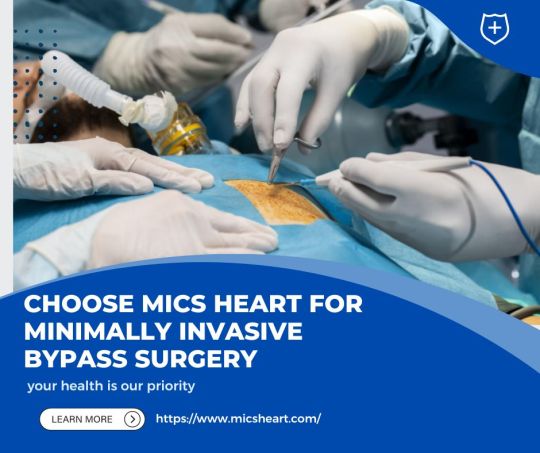
If you are considering heart surgery, choose the experts at MiCS Heart for a minimally invasive approach. Our cardiac surgeons are trained in the latest techniques and technology to provide you with the best possible care. Minimally invasive bypass surgery offers several benefits over traditional surgery such as smaller incisions, less pain and scarring, faster recovery, and a shorter hospital stay. At MiCS Heart, we offer personalized care and attention to each patient. We aim to help you achieve optimal heart health and a better quality of life. Choose MiCS Heart for your minimally invasive bypass surgery and experience the difference.
Visit Us:- https://www.micsheart.com/
#Robotic Heart Surgery#Robotic Bypass Surgery#Robotic Heart Bypass Surgery#Robotic Heart#Robotic Open Heart Surgery#Robotic Cardiac Surgery#Robotic Heart Surgery Cost#Minimally Invasive Heart Surgery#Minimally Invasive Bypass Surgery#Robotic CABG#Minimally Invasive CABG
0 notes
Text
Minimally Invasive Heart Bypass Surgery in India
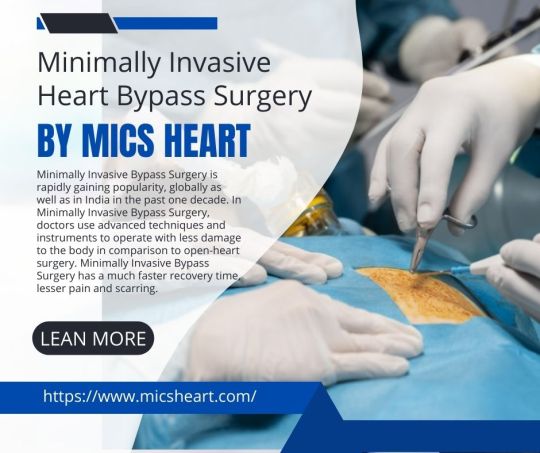
Experience the latest advancements in heart surgery with minimally invasive techniques in India. These procedures offer several benefits such as smaller incisions, reduced pain and scarring, faster recovery time, and a shorter hospital stay. With skilled and experienced cardiac surgeons, cutting-edge technology, and state-of-the-art facilities, India is a leading destination for heart surgery. At MiCS Heart, we specialize in providing personalized and comprehensive patient care. Our minimally invasive bypass surgery is a safe and effective solution that can help improve your heart health and get you back to living your life to the fullest.
Visit Us:- https://www.micsheart.com/
#Robotic CABG#Minimally Invasive CABG#Minimally Invasive Aortic Valve Replacement Recovery Time#Minimally Invasive Cardiac Surgery#Minimally Invasive Heart Surgery#Robotic Bypass Surgery#Robotic Heart Bypass Surgery#Robotic Heart#Robotic Open Heart Surgery#Robotic Cardiac Surgery
0 notes
Text

Robotics CABG
CABG is a surgical procedure used to treat significant blockages in coronary arteries. Symptoms such as chest pain or shortness of breath, or significant blockages in multiple arteries may indicate CABG as a treatment option. Consult a healthcare provider to determine if CABG is suitable. Don't delay, seek medical attention promptly. Learn more about Robotic CABG at: https://www.micsheart.com/mics-cabg/
0 notes
Text
With robotic heart valve surgery, precise repairs or replacements of the heart valves can be performed with minimal incisions, leading to quicker recovery times and a lower risk of complications. Contact us to learn more, visit: https://www.micsheart.com/robotic-mitral-valve-repair-2
0 notes
Text
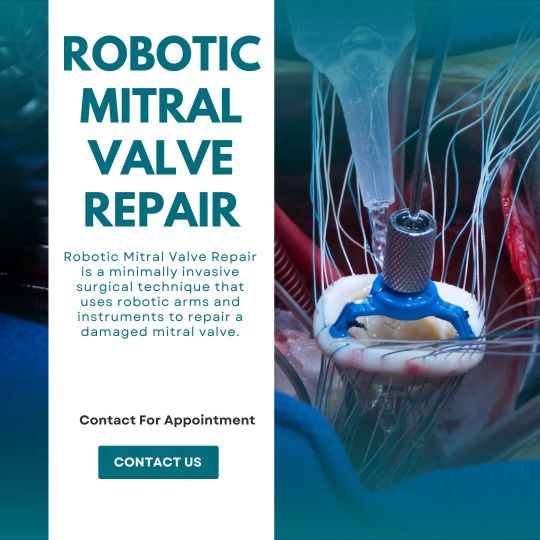
With smaller incisions and quicker recovery times, robotic mitral valve repair is a minimally invasive method of treating mitral valve disease. Schedule a consultation with us to learn more, visit: https://www.micsheart.com/robotic-mitral-valve-repair-2/
#robotic mitral valve repair#robotic mitral valve#robotic mitral valve repair replacement#robotic mitral valve repair surgery#minimally invasive cardiac surgery#robotic heart surgery#micsheart
0 notes
Text
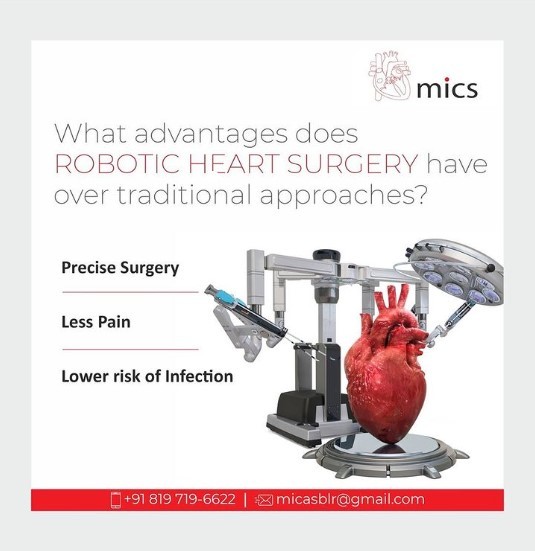
Advantage of Robotic Heart Surgery
The benefits of robotic heart surgery include less pain, scarring, a shorter hospital stay, and a faster recovery. Consider it a more precise and safer alternative to traditional open-heart surgery. If you need heart surgery, talk to your doctor about the advantages of robotic surgery as a safer and more effective option.
#Robotic Heart Surgery#Robotic heart surgery in india#minimally invasive cardiac surgery#robotic heart surgeries#micsheart
0 notes
Text

Minimally Invasive Cardiac Surgery reduces pain and recovery time by limiting the scope of surgery. It may be used on patients who are at high risk for open heart surgery due to obesity or other health issues, or on patients who have had previous open heart surgeries that can make repeat procedures difficult.
For further information about Minimally Invasive Cardiac Surgery visit: https://www.micsheart.com/
#Minimally Invasive Cardiac Surgery#Minimally Invasive Heart Surgery#robotic heart surgery#micsheart
0 notes
Text
Robotic CABG is a lower risk surgery with shorter recovery times and generally faster healing—and minimal scarring. Robotic-assisted CABG is a minimally invasive procedure using robotic arms over the chest wall to perform heart bypass surgery.
For further information about robotic CABG, visit: https://www.micsheart.com/mics-cabg/
#Robotic CABG#minimally invasive cabg#minimally invasive cardiac surgery#robotic heart surgery#micsheart
0 notes
Text
What are the advantages of Minimally Invasive Cardiac surgery?

Minimally invasive cardiac surgery is a surgical procedure that is performed in the specific cases where minimally invasive techniques are preferred over traditional open-heart surgery. Minimally invasive surgery is a surgical procedure used to treat medical conditions with the aid of a small opening and instruments that are inserted into this opening. The advantage of this surgery is that it is a less invasive type of surgery and as a result, it is associated with a lower incidence of complications such as bleeding, infection, organ damage and other such conditions. Another advantage is that it is associated with a higher level of patient satisfaction.
The surgical incisions left by a minimally invasive procedure heal faster and are less likely to become infected than large incisions. Patients undergoing MIS have shorter hospital stays than those who have traditional abdominal procedures. Many patients can go home after only one night spent in the hospital.
0 notes
Text
What is the success rate of a bypass?
Whereas in the past, heart bypass surgery was associated with a 20–25 percent mortality rate and serious complications for 50–75 percent of patients undergoing that procedure, today more than 95 percent of people who have coronary bypass surgeries do not experience serious complications, and immediate death after such procedures occurs only 1-2% of the time.
Meet us to understand why Minimally Invasive Cardiac Surgery and Robotic Heart Surgery » at Micsheart.com » , Bangalore has the best results in the country.
Mobile +91 8197196622
Email [email protected]
Website https://www.micsheart.com/
Book an appointment with the best aortic valve replacement surgeons today to get proper treatment. https://www.micsheart.com/
0 notes